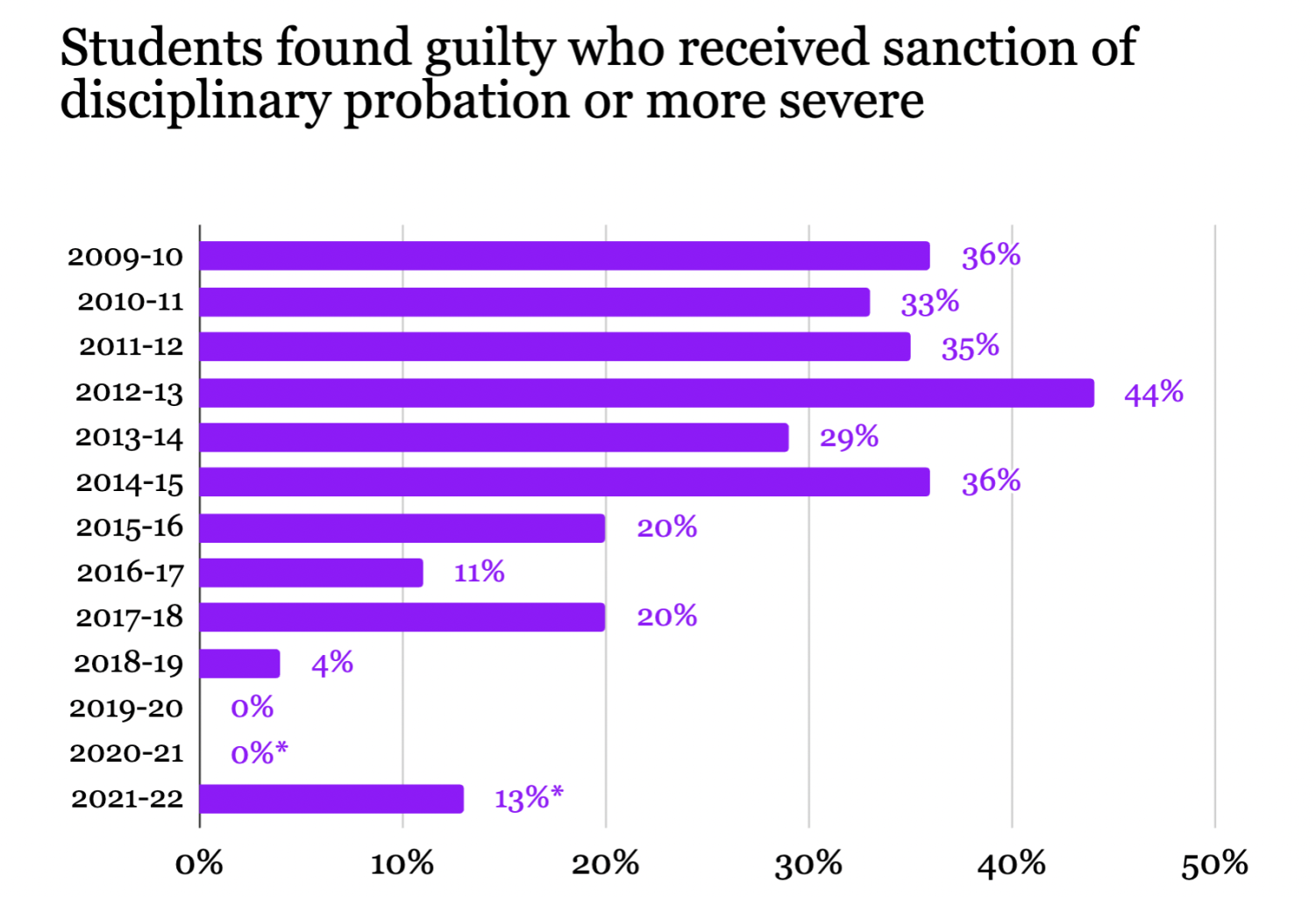Honor and Discipline Committee votes on bylaws to formalize procedures
Past and current members voice broader concerns about lack of sanction consistency
May 10, 2023

Voting is underway for members of the Honor and Discipline Committee to adopt a set of bylaws intended to formalize the committee’s internal processes. While the committee already follows a set of procedures to enforce the College’s Honor Code, the proposed bylaws will help ensure year-to-year consistency by putting the procedures in writing, said Simon Kent ’23, a member of the Honor and Discipline Committee who spearheaded a working group to write the document.
The internal vote will conclude today, although Kent does not expect any of the bylaws to be the subject of contention among committee members. “I feel that there’s nothing in there that’s significantly controversial,” he said. “It’s just making our process clearer and more streamlined.”
Following the vote, the committee will email the campus community about the bylaws and any changes that will be implemented, Kent said.
In a series of interviews with the Record, past and current members of the Honor and Discipline Committee raised concerns about a lack of an internal rubric guiding members on which sanction to recommend for students found responsible of violating the Honor Code. The bylaws — if passed — will ensure that committee members formally decide on a “baseline” sanction for the most common kinds of Honor Code violations each year, informed in part by previous years’ precedent.
When a student is accused of violating the Honor Code by a member of the College community, they are brought before the Honor and Discipline Committee, composed of eight students, eight faculty members, and the Dean of the College. At a hearing, both the reporter and the accused student make their cases, after which student members of the committee vote to determine whether the student is guilty of violating the Honor Code and — if they are found guilty — what sanction they should receive. The sanction must then be approved by the Dean of the College.
While the College’s Honor Code identifies what constitutes a violation — misrepresenting others’ ideas in one’s own work or failing to abide by a professor’s stipulations for academic integrity — and includes a list of possible sanctions that range from a warning to expulsion, it does not dictate how the committee should determine which sanctions to give.
In part, the lack of a rubric led Cooper Stuntz ’24 to decide not to seek re-election after serving on the committee in his sophomore year. “I thought the committee was really ineffective at doing its stated goals,” he told the Record. “I think it’s unjust that we don’t have a procedure about how we should decide.”
Stephanie Goodrich ’23, who also decided not to seek re-election after serving for three years, described a tendency for newer members to defer to the committee’s student chair because of a lack of a clear rubric. “I was definitely influenced by the student chair my freshman year,” she said. “The younger people are more harsh but are also quicker to give up. It’s a very identifiable dynamic.”
Onder Kilinc ’23.5, who serves as co-chair of the committee and has been a member since his first year at the College, said that to maintain some consistency in sanctions, committee members meet at the beginning of the year to discuss “what kind of direction they want to take the semester in,” including what they think their baseline sanction should be.
Other members, however, described a lack of guidance in determining an appropriate sanction. “We don’t have a clear consensus within the committee [for] a way to decide sanctions for violations,” Stuntz said.
In the 2020-2021 and 2021-2022 academic years, committee members recommended less severe sanctions during the COVID-19 pandemic after determining the “extraordinary stress of the year warranted some leniency,” per the committee’s reports. In the 2020-2021 academic year, no student received a sanction harsher than a failure in the assignment, and in 2021-2022, only 25 percent of students found guilty received the sanction of failure in the course — down from 69 percent in 2019-2020.
However, the decline in the severity of sanctions largely pre-dates the pandemic. Since the 2012-2013 academic year, for instance, the number of students receiving a sanction of academic probation or worse has trended downward by roughly 40 percent — before any pandemic-related changes were implemented.

Multiple past and current members of the Honor and Discipline Committee also expressed frustration over a lack of clarity regarding which factors can be weighed when determining a student’s sanction.
The bylaws, if passed, will note that Committee members should determine sanctions based on the severity of the Honor Code violation and the impact it had on the campus community. Sam Sidders ’25, who currently serves as co-chair of the committee and is a member of the bylaws working group, told the Record that, in the future, she would like to adopt an additional document that outlines what Committee members should consider more explicitly
In December of 2020, then-student chair of the committee Morgan Noonan ’22 told the Record that the committee had been shifting to be more lenient to promote notions of redemption for which, she said, sanctions like academic probation do not allow.
Sidders said that she found it difficult to make decisions when she first joined the committee as a first-year.
“I was always kicking myself for not being on the committee earlier, which was not possible, of course,” she said. “I wished I could go back in time and see how this was dealt with before.”
Because of this frustration, Sidders has been working on an additional document that will identify “archetypal cases” from previous years to inform current members about precedents from previous years — not to strive for perfect consistency across years, but rather so committee members have a sense of how similar cases were handled in the past.
“There are a lot of cases that come up a lot — maybe not necessarily exactly the same, but pretty similar,” she said. “Knowing the precedent will hopefully give committee members the necessary context to make an informed decision, but it’s not meant to override differences of opinion between members.”
Multiple past and current members of the Honor and Discipline Committee also expressed frustration over a lack of clarity regarding which factors can be weighed when determining a student’s sanction.
The bylaws, if passed, will note that Committee members should determine sanctions based on the severity of the Honor Code violation and the impact it had on the campus community. Sidders said that, in the future, she would like to adopt an additional document that outlines what Committee members should consider more explicitly.
Ultimately, Kent does not expect any bylaws to be contentious among committee members. “I feel that there’s nothing in there that’s significantly controversial,” he said. “It’s just making our process clearer and more streamlined.”
Julia Goldberg contributed reporting.







